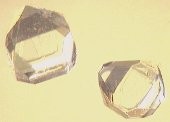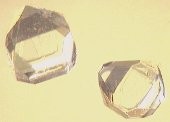If you regularly check the labels of the food products you consume, then you probably recognize the name xylitol. However, very few people really know what it is, why, and how it is used and most importantly if it is safe. The main aim of this article it to provide answers to all these common questions in a simple way.

5 Facts About Xylitol
by nichehunt
An introduction to xylitol covering what it is, its uses, potential side effects and benefits.
Fact #1: Xylitol is a Sweetener
 As the title of the first fact suggest xylitol is a sweetener. It can be used to replace sugar in commercial food products or in its granular form. Usually sweeteners are classified as natural or artificial. Artificial sweeteners are synthetic, while natural sweeteners can be found in nature. Xylitol is a natural sweetener as it can be found in several vegetables and fruits. Another way to classify sweeteners depends on their calorie content. Xylitol is a caloric sweetener, that means that it contains calories, albeit 40% less than table sugar.
As the title of the first fact suggest xylitol is a sweetener. It can be used to replace sugar in commercial food products or in its granular form. Usually sweeteners are classified as natural or artificial. Artificial sweeteners are synthetic, while natural sweeteners can be found in nature. Xylitol is a natural sweetener as it can be found in several vegetables and fruits. Another way to classify sweeteners depends on their calorie content. Xylitol is a caloric sweetener, that means that it contains calories, albeit 40% less than table sugar.
Image Source: commons.wikimedia.org/wiki/File:Xylitol_crystals.jpg
Fact #2: Xylitol Has Some Minor Side Effects
Although it is a natural sweetener it has a couple of minor side effects. Those side effects are mostly gastrointestinal and include bloating and diarrhea. However, the human body can adapt to increasing consumption of xylitol. That means that if you start using xylitol slowly and gradually increase the amount that you are consuming, chances are that you will not experience any of those unpleasant side effects. Finally some people have reported allergic reactions.
Xylitol Related Books
 | The Sweet Miracle of Xylitol: The All-Natural Sugar Substitute Approved by the FDA As a Food Addi... The average person eats one-half cup of sugar a day, more than is recommended for the average person, particularly people who suffer from diabetes, insulin resistance, and Syndr... |
 | Sweeten Your Life the Xylitol Way Nutritionist Karen Edwards has made many revisions and added more than two dozen new recipes to her popular first edition of Sweeten Your Life the Xylitol Way, giving you even m... |
 | Kiss Your Dentist Goodbye: A Do-It-Yourself Mouth Care System for Healthy, Clean Gums and Teeth You brush, floss, use mouthwashes, and are concerned about the foods you eat, yet you still require fillings or lengthy cleanings at the dentist. In Kiss Your Dentist Goodbye, D... Only $20.18 |
 | Xylitol: An Amazing Discovery for Health (Woodland Health) Though scientists identified the glyconutrient xylitol over a hundred years ago, its beneficial properties have been discovered only recently. With a low glycemic index of 7 (co... Only $21.94 |
 | Sweet Revolution. Cooking Without Sugar. **Winner of the 2011 Indie Excellence Award in the category of Food-Non-Fiction** Chef Ozzie uses Ideal No Calorie Sweetener to create delicious tasting foods, beverages, and sw... |
Fact #3: Xylitol Can Protect Your Teeth From Dental Caries.
 The main reason why people use xylitol and xylitol containing products is that it is good for your dental health. There are reports about other benefits of xylitol as well but this is the only one that is well established by a considerable number of scientific studdies. Actually, the first published study that discovered this benefit was performed in Finland almost 40 years ago (Turku Study). Since then, a number of other published studies have confirmed the original findings.
The main reason why people use xylitol and xylitol containing products is that it is good for your dental health. There are reports about other benefits of xylitol as well but this is the only one that is well established by a considerable number of scientific studdies. Actually, the first published study that discovered this benefit was performed in Finland almost 40 years ago (Turku Study). Since then, a number of other published studies have confirmed the original findings.
Without going into too much detail, some of the ways it can protect your teeth are:
- It neutralizes the pH of the oral cavity.
- It can't be used by the bacteria that cause dental caries.
- It makes it difficult for the tooth decay causing bacteria to stick on your teeth.
Image Source: Openclipart.org
Fact #4: If it Looks Like Sugar and Tastes Like Sugar, it Might Be Xylitol
One of the reasons that many people prefer this natural sweetener, is that it tastes almost exactly like sugar. A lot of the available commercial sweeteners might be able to sweeten your coffee, but they also alter the taste of it, and some others might have an unpleasant aftertaste. Most people that I know, who have tried it, they couldn't tell the difference between xylitol and regular table sugar. Also, it looks almost exactly like sugar but this is not really an important attribute.
Fact#5: Xylitol Is Dangerous for Dogs
 Every dog owner should be aware that xylitol can be extremely dangerous for his furry friend. The two main problems it can cause are a drop in blood glucose levels, and more importantly liver failure that might even lead to death. So if you are using xylitol or products that contain it, like xylitol gum, you need to make sure that your dog won't consume them, even by accident. If for any reason your dog eats something that contains xylitol you should immediately visit a vet.
Every dog owner should be aware that xylitol can be extremely dangerous for his furry friend. The two main problems it can cause are a drop in blood glucose levels, and more importantly liver failure that might even lead to death. So if you are using xylitol or products that contain it, like xylitol gum, you need to make sure that your dog won't consume them, even by accident. If for any reason your dog eats something that contains xylitol you should immediately visit a vet.
Image Source: Openclipart.org
You might also like
5 Crazy Myths About VeganismThere’s a general opinion that vegans are a bunch of pasty-faced, undernouris...
Don't get fat this ChristmasHaving lost weight, I am a little anxious about the approaching season and ha...



 Dirt Devil UD70095 Power Reach Multi Cyclonic Pet Bagless Upright Vacuum Cleaneron 06/02/2012
Dirt Devil UD70095 Power Reach Multi Cyclonic Pet Bagless Upright Vacuum Cleaneron 06/02/2012
 Garmin Zumo 220: A Well-Rounded, Rugged Motorcycle GPS Uniton 04/22/2012
Garmin Zumo 220: A Well-Rounded, Rugged Motorcycle GPS Uniton 04/22/2012
 5 of the Most Popular Hybrid Vehicles for 2012on 04/05/2012
5 of the Most Popular Hybrid Vehicles for 2012on 04/05/2012
 6 Essential Wordpress Pluginson 04/04/2012
6 Essential Wordpress Pluginson 04/04/2012



Comments